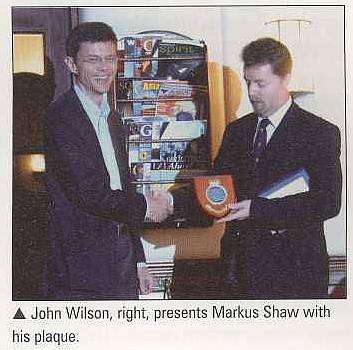Aug2007
archive > Log > Log2007
Hong Kong
"Save Our Seas"
Thirty
members and guests gathered at The Royal
Hong Kong Yacht Club on 20 June to hear Markus Shaw, Chairman of the Worldwide Fund For Nature Hong Kong,
speak on their SOS campaign. Mr Shaw began by
pointing out that fishing is in crisis around the world. In the 1950s. 70 per
cent of the world's fisheries were classified
as "undeveloped" but by the year 2000, 60 per cent were "fully exploited" and 20 per
cent were "collapsed". Over fishing dates from the 1960s, when there was
a massive increase in catches due to improvements in fishing technology. At the
present rate of decline, commercial fisheries will be exhausted by 2048.
One of
the most deadly threats is posed by inshore trawlers. One pass of such a
trawler can destroy 20 per cent of life on the seabed, and the practice is
banned in most countries, including China Tolo Harbour Hong Kong waters is just 10 grams — useless for
feeding the population, so most of the catch is used to produce fish food for the local fish farms.
The WWF
campaign is calling on the HKSAR government to ban inshore trawling and
create reserves which will be designated as no-take zones. At present, fishing is not prohibited in our marine
reserves, but studies show that no-take zones
allow fish to grow to maturity within their boundaries and then spread
out to improve the fishing in surrounding areas.
WWF Hong
Kong has proposed making Port Shelter and Tolo Harbour no-take zones. It
claims that, although this is only 9.8 per cent of our water area, it will
demonstrate to local fishermen and to government the benefits of such a scheme.
Furthermore, it would turn these areas into `underwater wonderlands' which
would attract divers and others, and create jobs for the fishermen affected by
the loss of fishing areas. Markus Shaw is calling for a new economic model
based upon recreation and tourism, and is actively promoting his ideas to
government and the local fishing community. WWF Hong Kong has even organised seminars where local fishermen are invited to
meet fishermen from New Zealand and the Philippines who can describe
to them the success of such schemes in those countries.
Mr Shaw concluded by pointing out that the world's
population has tripled since 1930, and feeding such vast numbers is only
sustainable if our resources are managed in new and imaginative ways.
The
presentation was followed by a lively question and answer session which
indicated that the talk had generated a great deal of interest and concern. At
the end of the evening, Branch Chairman John Wilson presented Mr Shaw with a Nautical Institute plaque to thank him for taking the time to give us such a thought-provoking
paper: (see picture.)
Captain Alan Loynd
FNI

Seaways August 2007

